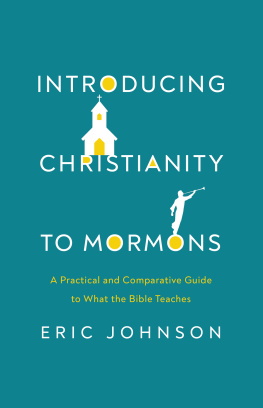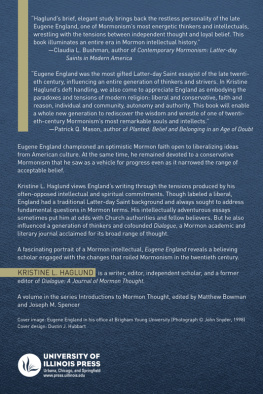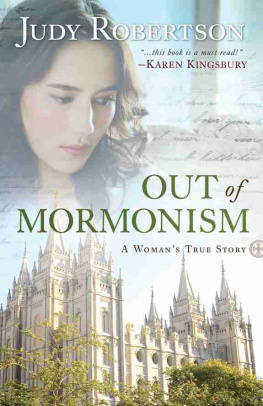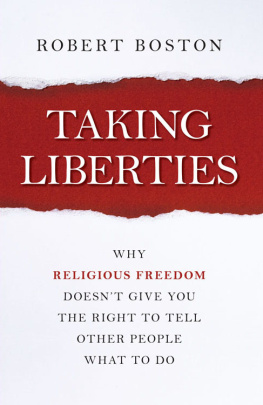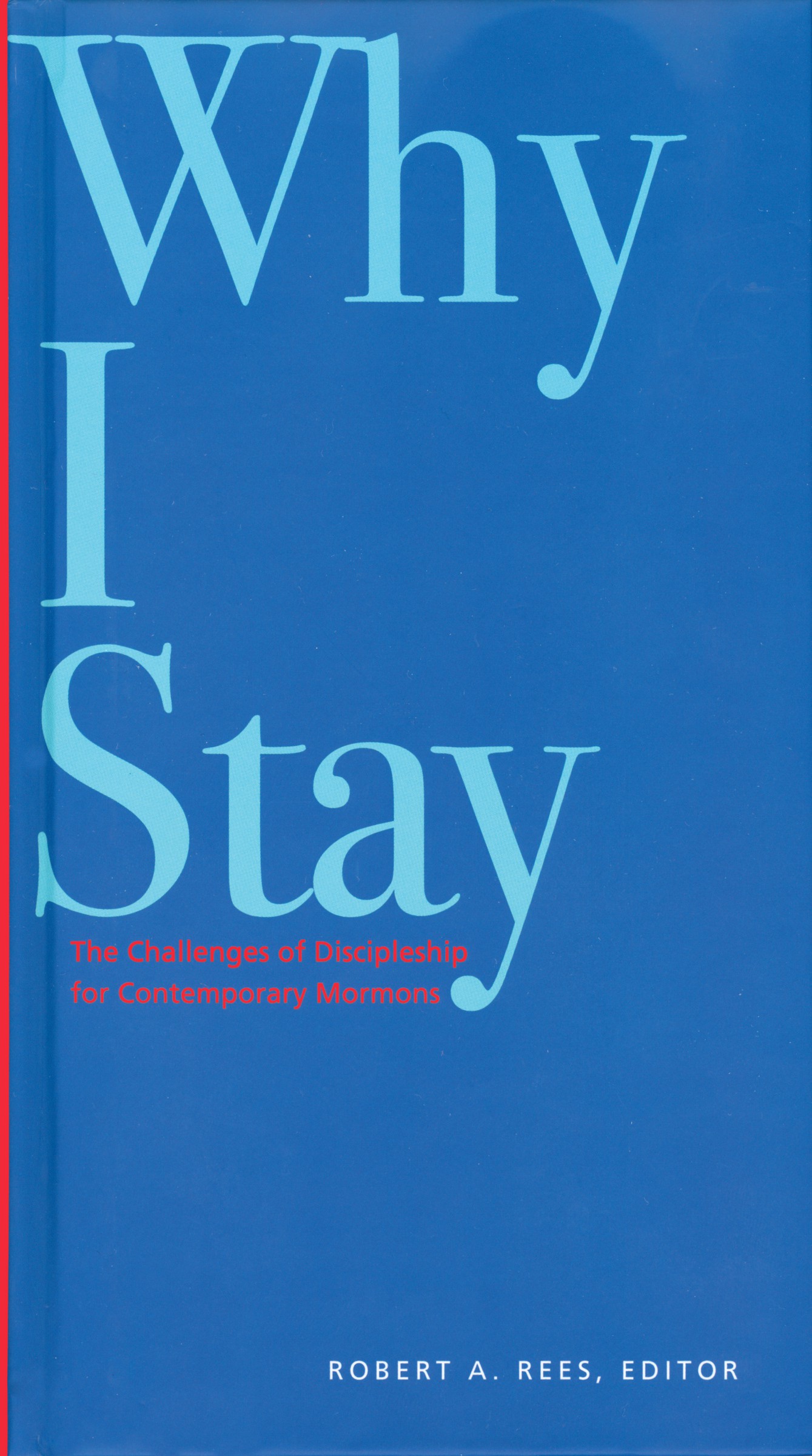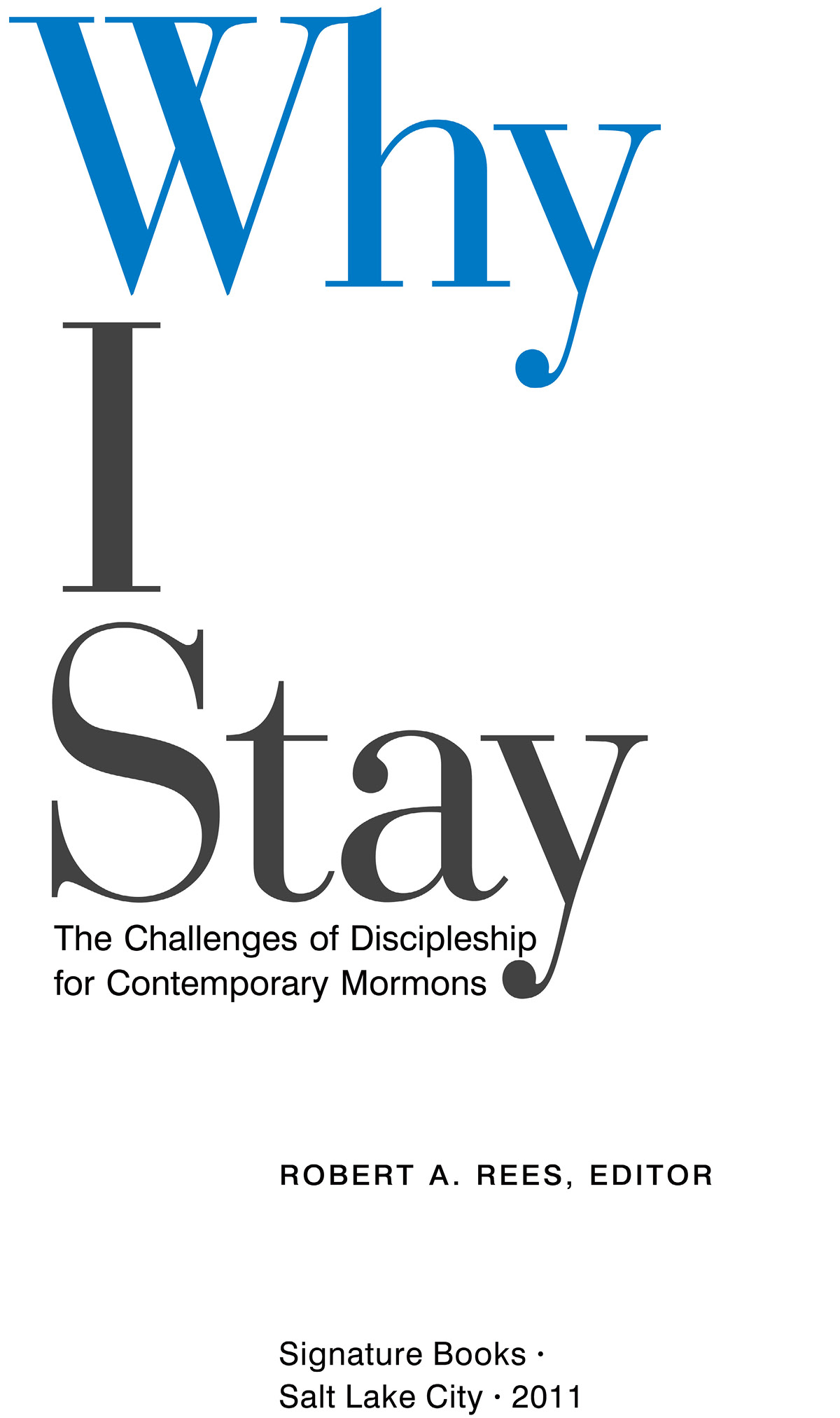Cover by Ron Stucki
Why I Stay was printed on acid-free paper and was composed,
printed, and bound in the United States of America.
Copyright 2011 Signature Books. Signature Books is a registered trade
mark of Signature Books Publishing, LLC. All rights reserved.
www.signaturebooks.com
LIBRARY OF CONGRESS CATALOGING -IN-PUBLICATION DATA
Why I stay : the challenges of discipleship for contemporary
Mormons / edited by Robert A. Rees.
p. cm.
Includes bibliographical references.
ISBN 1-56085-213-5 (978-1-56085-213-1 : alk. paper)
1. MormonsReligious life. 2. Church of Jesus Christ of
Latter-day SaintsMembership. I. Rees, Robert A., 1935
editor.
BX 8656. W 55 2011
248.4'893dc23
2011030893
Contents
Editors Introduction
Lord, to whom shall we go?
Thou hast the words of eternal life.
Peter to Jesus (John 6:68)
Deciding whether to stay in or leave ones faith tradition is among the most difficult and soul-wrenching decisions a person can face. There are those who feel firmly rooted in their religion for a lifetime; others bolt from a church, temple, or mosque suddenly, impulsively, and ultimately; still others lapse, as Emily Dickinson said of the passing of summer, as imperceptibly as grief. There are believers who experience the tension between the impulse to leave and the magnetic pull to stay. Those who experience little or no tension see staying as axiomatic and sail forever on a calm sea of devotion. Others who experience periodic or even constant tension navigate their way on a turbulent sea of faith and reason, of belief and doubt, of individual conscience and institutional devotion. Over the course of a lifetime, a few Saints ebb and flow between the poles of going and staying.
All religions have a problem with retention. Even Jesus had difficulty retaining his disciples, judging from the fast falling away of some followers while he was still alive: From this time many of his disciples turned back and no longer followed him (John 6:66, New International Version). This is foreshadowed in Jesuss Parable of the Sower where it seems that more of his seeds (followers) fell by the wayside, fell on stony ground, and fell among thorns than the few that fell on good earth. Even among the latter, fewer still remained fully faithful by yielding a hundredfold (Matt. 13:1-23).
There are many reasons why people stay in a religion and many reasons why they leave. Not all reasons for staying are motivated by faith and loyalty nor all those for leaving motivated by faithlessness and disloyalty. That is, some are kept in the fold by fear and some leave out of self-preservation. Some stay because they find holiness in the Restored Gospel; others leave because they find a more holy and hospitable place elsewhere. Many who leave their Church gravitate to other Churches. In an article titled Faith in Flux, Patricia Zapor, citing a study by the Pew Forum on Religion & Public Life, states, When the number of people who now practice a different faith than that of their childhood is added to those who have moved around among religions or denominations and come back to where they started, nearly half of Americans have changed religions at some point.
It is interesting to note that many of those who leave the LDS Church (either officially or unofficially) stay emotionally connected to Mormon culture, if not to the Church itself. This is attested by the number of ex-Mormon groups that attempt both to justify their leaving and to persuade others to follow them, including the following:
Exmormon Foundation
Ex-Mormons for Jesus
Mormon No More
PostMormon Community
Recovery from Mormonism
There are also those who leave the Church spiritually but not physically, those who leave it physically but not spiritually, and those who try for some accommodation between the two. New Order Mormons (NOM), for instance, encourages members to stay in spite of disagreement over certain teachings and practices.
For those who remain in the Church, there is an inevitable sadness over those who leave. This sadness is compounded when the reasons for leaving are un-Christianlike treatment by Church leaders or members or when the rupture in the relationship was preventable by greater compassion and charity. Part of the sadness is because separation from the body of saints often means a sacrifice of shared intimacy and joy and the conviction that some eternal bond has been frayed or broken, with both mortal and eternal consequences. I suspect that each contributor to this volume has family and friends who no longer consider themselves members of the fold and therefore the authors staying is motivated in part by the hope that their faithfulness might ultimately be persuasive to others.
What seems evident from the personal expressions of faith, challenge, and devotion in this collection is that many contemporary Latter-day Saints remain committed to the Church in spite of personal difference or spiritual dissonance over beliefs, doctrines, and practices. For some, like Lael Littke, leaving has been a temptation they have felt on occasion but have successfully resisted; for others, leaving has never been a considered option. As Armand Mauss writes, I have never contemplated leaving. Mary Bradford echoes this sentiment when she says, My first thought is where I might go if I werent [Mormon]. The Church is my village and my home. Although his essay includes reasons why he stays in spite of difficulties, Bill Bradshaw says that he remains because he wants to, that he has not had a serious inclination to leave. This epitomizes the view of most thoughtful, faithful Mormons, including those who contributed essays to this collection. Cherry Silver expresses similar sentiments: I stay in the Church because this is the only way of life that seems real to me. Her sister-in-law, Claudia Bushman, agrees, saying, My question is not why I stay in the Church, but why should I leave? She adds, I love the Church. I dont want to leave it. My Church experience and identity are deeply ingrained. It may even come before my identity as a woman. It certainly comes before my identity as an American.
Greg Prince takes a pragmatic view: On a variety of levels, the Church learns from its mistakes and continues forward while I do the same. It has its share of problems, as do other Churches, and as we work to resolve, rather than ignore, those problems, we and the Church become better. Fred Christensen accepts the Churchs problems as a necessary part of enjoying its blessings: I believe the Church has been a contributing factor to my good life. I am disturbed by much of the Churchs orthodoxy, but I have managed to discount it in the balance. I think there is room in the Church for differing views. At least, I hope others who have views like mine are consoled that I remain, while those whose views are different will continue to tolerate me. Charlotte England acknowledges that the road was not always smooth in the Church for her and her husband, Gene, but that leaving would have meant abandoning our core beliefs, which were too deeply embedded for us to forsake.
A number of contributors feel a strong connection to their pioneer heritage and a religious commitment to their own families. Some are fifth- and sixth-generation Latter-day Saints and feel, as Toby Pingree, that they are Mormon to [their] bones. I stay because of my heritage, writes Bill Bradshaw, because of those who came before me to whom I am indebted, because of sacrifices of which I am only dimly aware but which have made life and faith possible. Some feel a similar hold not only because of an obligation to past generations but also because of a stewardship to current and future generations. Tom Rogers says, I am locked in by extensive ancestral and familial ties. As a father of seven and grandfather of thirty-seven, I sufficiently appreciate the Churchs blessing to my progeny that I do not want to discourage their attachment to it. I realize that, by itself, this is a strictly pragmatic, subjective, and ultimately inadequate criterion, but I offer it here for the sake of candor.



